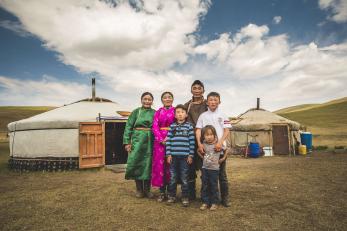Mercy Corps Mongolia: Legacy and Impact

In 1990, Mongolia began the transition from a socialist state to a full-fledged democracy, participating in the global free market economy. Although this transition came peacefully, many social and economic challenges arose as the Mongolian people and government adjusted to new governance and economic systems.
Mercy Corps Mongolia (MCM) was established in 1999 to address the need for innovation in economic development. Over the next 22 years, MCM partnered with local and national government agencies, civil society organisations, businesses, and communities to help ensure that rural livelihoods are resilient to economic shifts, environmental shocks and stresses, and institutional transitions while retaining distinct and vital cultural traditions.
Now, the agency recognises that local stakeholders—under the leadership of the Mongolian government and the innovative thinking of the private sector—are in the drivers’ seat of development in Mongolia. Rural markets are thriving, Mongolian civil society is ready for large nongovernmental organisations to step out of the way as their networks with community and government are both effective and transparent, and the government has created and will sustain an enabling environment to support environmentally responsible, dynamic, adaptable business growth.
Thus, in the second half of 2020, Mercy Corps International announced the difficult decision to sunset our Mongolia programme in May 2021. We see the sunset of MCM as part of a natural progression in development work to be celebrated. We are proud of the contributions we’ve made over two decades of innovative, impactful, influential programming. The information included on this page tells the story of our legacy and demonstrates our impact.
The Legacy of Mercy Corps Mongolia: 22 Years of Progress
Download the legacy report in English ▸
Download the legacy report in Mongolian ▸
When Mercy Corps began working in Mongolia in 1999, we brought bold, forward thinking to the efforts already underway as the country transitioned to a thriving free-market economy and democracy. Throughout the next two decades, Mercy Corps enjoyed deep and genuine partnerships with the private sector, civil society, and the government of Mongolia. We have delivered over £42 million of assistance over the years through impactful economic development, good governance, and disaster risk reduction programming in almost every province in the country. This Legacy Report tells that story, tracing the arc of our programmes and partnerships and showcasing some of the key accomplishments and impacts of Mercy Corps’ work in Mongolia spanning 22 years.
Impact Stories: Mercy Corps Mongolia’s Partners and Projects
Download the Impact Stories Book in English ▸
Download the Impact Stories Book in Mongolian▸
From 2015-2020, Mercy Corps implemented three phases of the Leveraging Tradition and Science (LTS) programme. Funded by the Bureau of Humanitarian Assistance at the United States Agency for International Development, the programme was aimed at reducing the vulnerability of herder households in Mongolia through disaster risk preparedness, improved rangeland management practices, and participatory disease surveillance. In addition, from 2017 to March 2021, under the Resilient Communities Programme (RCP), Mercy Corps worked with private sector partners up and down the livestock value chain to stimulate livestock production, strengthen livestock related value-chains, increase market information and access, and create opportunities for economic diversification.
This book of Impact Stories captures highlights from LTS and RCP and reflects accomplishments realised from joint implementation of innovative projects with the Mongolian government, private sector, and civil society partners. The successes showcased in this book belong not only to Mercy Corps but are shared with the individuals, businesses, organisations, and government entities driving change in the livestock sector and enabling development in rural Mongolia.